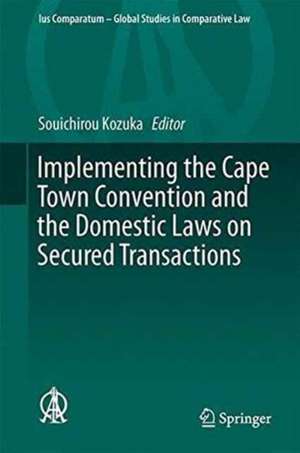Implementing the Cape Town Convention and the Domestic Laws on Secured Transactions: Ius Comparatum - Global Studies in Comparative Law, cartea 22
Editat de Souichirou Kozukaen Limba Engleză Hardback – 2 feb 2017
| Toate formatele și edițiile | Preț | Express |
|---|---|---|
| Paperback (1) | 949.10 lei 6-8 săpt. | |
| Springer International Publishing – 15 iul 2018 | 949.10 lei 6-8 săpt. | |
| Hardback (1) | 955.08 lei 6-8 săpt. | |
| Springer International Publishing – 2 feb 2017 | 955.08 lei 6-8 săpt. |
Din seria Ius Comparatum - Global Studies in Comparative Law
- 18%
 Preț: 1584.40 lei
Preț: 1584.40 lei - 18%
 Preț: 1009.22 lei
Preț: 1009.22 lei - 18%
 Preț: 1573.51 lei
Preț: 1573.51 lei - 18%
 Preț: 1255.16 lei
Preț: 1255.16 lei - 24%
 Preț: 1515.12 lei
Preț: 1515.12 lei - 24%
 Preț: 802.76 lei
Preț: 802.76 lei - 15%
 Preț: 651.84 lei
Preț: 651.84 lei - 18%
 Preț: 958.56 lei
Preț: 958.56 lei - 24%
 Preț: 812.88 lei
Preț: 812.88 lei - 15%
 Preț: 653.33 lei
Preț: 653.33 lei - 15%
 Preț: 654.43 lei
Preț: 654.43 lei - 18%
 Preț: 1401.16 lei
Preț: 1401.16 lei - 18%
 Preț: 1007.80 lei
Preț: 1007.80 lei - 18%
 Preț: 898.89 lei
Preț: 898.89 lei - 18%
 Preț: 956.99 lei
Preț: 956.99 lei - 18%
 Preț: 789.98 lei
Preț: 789.98 lei - 15%
 Preț: 644.95 lei
Preț: 644.95 lei - 18%
 Preț: 953.97 lei
Preț: 953.97 lei - 18%
 Preț: 1009.85 lei
Preț: 1009.85 lei - 18%
 Preț: 2787.02 lei
Preț: 2787.02 lei - 18%
 Preț: 1010.03 lei
Preț: 1010.03 lei - 18%
 Preț: 1403.67 lei
Preț: 1403.67 lei - 18%
 Preț: 2114.90 lei
Preț: 2114.90 lei - 18%
 Preț: 2107.49 lei
Preț: 2107.49 lei - 18%
 Preț: 997.71 lei
Preț: 997.71 lei - 18%
 Preț: 955.40 lei
Preț: 955.40 lei
Preț: 955.08 lei
Preț vechi: 1164.73 lei
-18% Nou
Puncte Express: 1433
Preț estimativ în valută:
182.78€ • 198.47$ • 153.53£
182.78€ • 198.47$ • 153.53£
Carte tipărită la comandă
Livrare economică 22 aprilie-06 mai
Preluare comenzi: 021 569.72.76
Specificații
ISBN-13: 9783319464688
ISBN-10: 331946468X
Pagini: 350
Ilustrații: IX, 380 p.
Dimensiuni: 155 x 235 x 22 mm
Greutate: 0.72 kg
Ediția:1st ed. 2017
Editura: Springer International Publishing
Colecția Springer
Seria Ius Comparatum - Global Studies in Comparative Law
Locul publicării:Cham, Switzerland
ISBN-10: 331946468X
Pagini: 350
Ilustrații: IX, 380 p.
Dimensiuni: 155 x 235 x 22 mm
Greutate: 0.72 kg
Ediția:1st ed. 2017
Editura: Springer International Publishing
Colecția Springer
Seria Ius Comparatum - Global Studies in Comparative Law
Locul publicării:Cham, Switzerland
Cuprins
Foreword; Roy Goode.- About the Authors.- Part I Introduction,- About This Book; Souichirou Kozuka.- Implementation of the Cape Town Convention into and its relationship with National Law; Jeffrey Wool.- Part II General Report.- 2. The Cape Town Convention and its implementation in domestic law: General report; Souichirou Kozuka.- Part III National Reports.- A. Parties to the Cape Town Convention.- 3. Les sûretés sur des aéronefs en droit canadien, la Convention relative aux garanties internationales portant sur des matériels d’équipement mobiles et son Protocole aéronautique; Frédérique Sabourin.- 4. The law of England and Wales on secured transactions as compared with the Cape Town Convention; George Leloudas.- 5. Indonesia’s Report: The Implementation of The Cape Town Convention 2001; Prita Amalia.- 6. Implementation of the Cape Town Convention in Malaysia; Mary George and Vince See.- 7. The Cape Town Convention on InternationalInterests in Mobile Equipment and its implementation in the Netherlands and on the Dutch Caribbean Islands; Sjef van Erp.- 8. Russian legislation and Cape Town Convention; Nataliya Doronina.- 9. The Cape Town Convention and its Implementation in South African Air Law; Phetole Sekhula.- 10. The Cape Town Convention and its Implementation in Spanish Law; Teresa Rodríguez de las Heras Ballell.- 11. United States of America: Reconsidering the Transaction Document Filing Requirement for National Registry; Charles W. Mooney, Jr..- B. Non State Parties to the Cape Town Convention.- 12. Finnish Mortgage System for Means of Transport: Outdated and Overly Complex?; Teemu Juutilainen.- 13. La Convention du Cap et sa reconnaissance en droit français; Philippe Delebecque.- 14. Security interests in mobile equipment under German law – Some notes on the similarities and differences in relation to the Cape Town regime; Benjamin von Bodungen.- 15. The GreekLaw on Security interests burdening transport vehicles as compared with the Cape Town Convention; Elina N. Moustaira.- 16. The Cape Town Convention and Italian Law on Secured Transactions; Anna Veneziano.- 17. The Security interest in transport vehicles in Japan; Haruna Fujisawa.- 18. The Cape Town Convention and Polish law on security interests; Maria Dragun-Gertner, Zuzanna Pepłowska-Dąbrowska and Jacek Krzemiński.- 19. Security interests in transport vehicles: The Cape Town Convention and Portuguese law; Maria Helena Brito.- 20. Rapport suisse sur le thème « Les sûretés grevant les moyens de transport – La Convention du Cap et sa transposition en droit national »; Bénédict Foëx.- Part IV Comments from the Practice.- 21. Analysing the Effects of the Cape Town Convention on Four Selected Issues That Hinder the International Financing and Leasing of Aircraft and Engines; Patrick Honnebier.- 22. The Luxembourg rail protocol to the CapeTown convention: Some Practical Differences from the Aviation Protocol; Howard Rosen.- 23. Entering into force: Promoting Unidroit’s Space Protocol among emerging space actors; Daniel A. Porras.- Appendix: Questionnaire for national reporters.
Notă biografică
Prof. Souichirou Kozuka (Ph.D. Tokyo), is Professor of Law at Gakushuin University, Tokyo. He specialises in commercial law, transnational commercial law and corporate law. He has been correspondent of UNIDROIT (International Institute for the Unification of Private Law), associate member of the International Academy of Comparative Law and program convenor of ANJeL (Australian Network of Japanese Law). He also serves currently as co-chair of the Space Law Committee of the International Bar Association (IBA).
Textul de pe ultima copertă
This book offers the analysis of the relationship between the Cape Town Convention and national laws on secured transactions. The first part of the book considers why national implementation is so important in the case of the Cape Town Convention and identifies how innovative the Convention is as a uniform law instrument. The second part includes chapters on those states that are Parties to the Cape Town Convention, which analyse how the Convention is implemented under the domestic law. The third part includes chapters on those states that are not Parties to the Convention, which compare their national laws and the Convention to find unique features of the Cape Town Convention’s rules. The fourth part discusses the meaning of Protocols on aircraft, railway rolling stock and space assets from the practitioner’s point of view. As a whole, the book offers insights into the new stage of uniform private law and shows the need for further examination of the subject, which will be essential for international and national legislators, academics of comparative and international private law as well as practitioners who are the users of the uniform law regime.
Caracteristici
First-ever comparative study of national laws relevant to the Cape Town Convention on secured transactions law Connects the study of secured transactions law to an analysis of the Convention Presents a guide for legislators considering the ratification of the Cape Town Provides insights into the meaning of uniform private law that suggest the need for further examinations on the subject?












